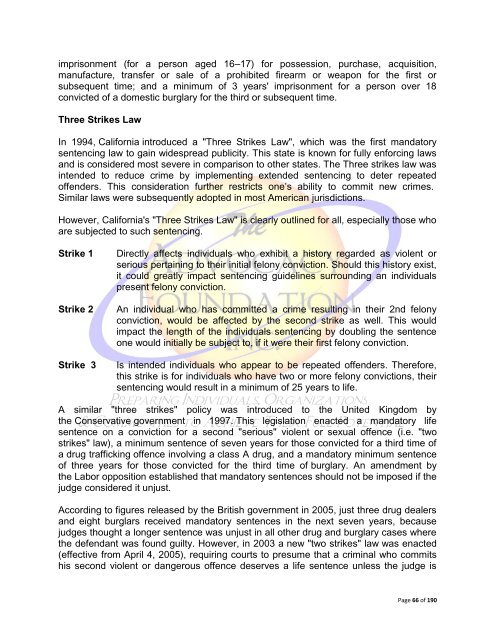The Violent Crime and Law Enforcement Act of 1994
The Violent Crime and Law Enforcement Act of 1994
The Violent Crime and Law Enforcement Act of 1994
You also want an ePaper? Increase the reach of your titles
YUMPU automatically turns print PDFs into web optimized ePapers that Google loves.
imprisonment (for a person aged 16–17) for possession, purchase, acquisition,<br />
manufacture, transfer or sale <strong>of</strong> a prohibited firearm or weapon for the first or<br />
subsequent time; <strong>and</strong> a minimum <strong>of</strong> 3 years' imprisonment for a person over 18<br />
convicted <strong>of</strong> a domestic burglary for the third or subsequent time.<br />
Three Strikes <strong>Law</strong><br />
In <strong>1994</strong>, California introduced a "Three Strikes <strong>Law</strong>", which was the first m<strong>and</strong>atory<br />
sentencing law to gain widespread publicity. This state is known for fully enforcing laws<br />
<strong>and</strong> is considered most severe in comparison to other states. <strong>The</strong> Three strikes law was<br />
intended to reduce crime by implementing extended sentencing to deter repeated<br />
<strong>of</strong>fenders. This consideration further restricts one’s ability to commit new crimes.<br />
Similar laws were subsequently adopted in most American jurisdictions.<br />
However, California's "Three Strikes <strong>Law</strong>" is clearly outlined for all, especially those who<br />
are subjected to such sentencing.<br />
Strike 1<br />
Strike 2<br />
Strike 3<br />
Directly affects individuals who exhibit a history regarded as violent or<br />
serious pertaining to their initial felony conviction. Should this history exist,<br />
it could greatly impact sentencing guidelines surrounding an individuals<br />
present felony conviction.<br />
An individual who has committed a crime resulting in their 2nd felony<br />
conviction, would be affected by the second strike as well. This would<br />
impact the length <strong>of</strong> the individuals sentencing by doubling the sentence<br />
one would initially be subject to, if it were their first felony conviction.<br />
Is intended individuals who appear to be repeated <strong>of</strong>fenders. <strong>The</strong>refore,<br />
this strike is for individuals who have two or more felony convictions, their<br />
sentencing would result in a minimum <strong>of</strong> 25 years to life.<br />
A similar "three strikes" policy was introduced to the United Kingdom by<br />
the Conservative government in 1997. This legislation enacted a m<strong>and</strong>atory life<br />
sentence on a conviction for a second "serious" violent or sexual <strong>of</strong>fence (i.e. "two<br />
strikes" law), a minimum sentence <strong>of</strong> seven years for those convicted for a third time <strong>of</strong><br />
a drug trafficking <strong>of</strong>fence involving a class A drug, <strong>and</strong> a m<strong>and</strong>atory minimum sentence<br />
<strong>of</strong> three years for those convicted for the third time <strong>of</strong> burglary. An amendment by<br />
the Labor opposition established that m<strong>and</strong>atory sentences should not be imposed if the<br />
judge considered it unjust.<br />
According to figures released by the British government in 2005, just three drug dealers<br />
<strong>and</strong> eight burglars received m<strong>and</strong>atory sentences in the next seven years, because<br />
judges thought a longer sentence was unjust in all other drug <strong>and</strong> burglary cases where<br />
the defendant was found guilty. However, in 2003 a new "two strikes" law was enacted<br />
(effective from April 4, 2005), requiring courts to presume that a criminal who commits<br />
his second violent or dangerous <strong>of</strong>fence deserves a life sentence unless the judge is<br />
Page 66 <strong>of</strong> 190
















